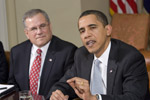
An important piece in the L.A. Times draws from Special Envoy Gration’s recent testimony before the Senate Foreign Relations Committee as an indication of the direction of the Obama administration’s ongoing policy review. In particular, the article describes the competing strategies internally under consideration by the Obama administration and the pressure advocacy groups have placed – and, in short order, will ramp up – to ensure that U.S. policy doesn’t back away from a tough line with Khartoum.
Here are some excerpts to illustrate the range of perspectives:
White House officials say that specific conditions would have to be met before sanctions would be lifted, and that Sudan could face even tougher sanctions if its leaders act in bad faith. But President Obama’s handpicked envoy to Sudan, J. Scott Gration, said in an interview Monday that the Khartoum government, which expelled humanitarian groups this year after an international court accused Sudan’s president of war crimes in Darfur, has shown a willingness to work toward stabilizing Darfur in order to allow aid to be delivered.
"We see that there is a spirit of cooperation and an attitude of wanting to help," Gration said.
The American envoy acknowledged that lifting sanctions could help bolster the Sudanese government, but he said the new policy would be prudent and cautious.
And:
"We have to see verifiable change for the Sudanese people," said the [White House] official, calling it a "misconception" that "somehow we want to take the [regime] out for ice cream and then think that that changes everything in Sudan."
On the other side, from the advocacy community:
"We fear [Gration is] being too concessionary," said Randy Newcomb, president of Humanity United, a foundation that gets its money from the founders of EBay and is bankrolling the publicity campaign [to convince the White House to maintain pressure on Khartoum].
"These are people in the administration we’ve been friendly with, but we’ve got to keep the pressure on them to make sure they are very aggressive," Newcomb said.
And from Chairman of the Senate subcommittee on Africa Russ Feingold (D-WI), who pressed Gration for evidence of Khartoum’s goodwill in last week’s hearing:
Gration’s approach sounded “"a little too gentle considering what [the Sudan government is] doing and what they’ve done in the past."
Well worth a read.

